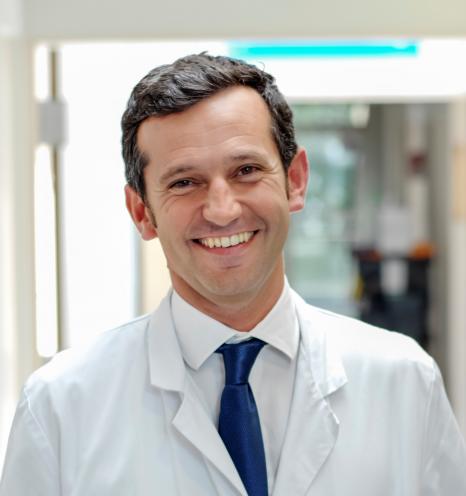
Benjamin Besse: a deeper understanding of thoracic cancers
Benjamin Besse is Professor of Medical Oncology at Université Paris-Saclay and Head of Clinical Research at Gustave Roussy. He is a specialist in managing thoracic cancers, with a specific research focus on the application of molecular abnormalities to personalise treatment, circulating biomarkers, and early drug development in thoracic tumours and thymic malignancies. He is also the co-author of more than 250 peer-reviewed papers and was one of the 25 most cited scientists in their discipline at Université Paris-Saclay in 2022.
"Patients put their lives in our hands. This creates an extremely close bond between us that demands that we give our best. That's really what I love about my work," explains Benjamin Besse. Although explaining that his vocation came a little late, he acknowledges that once he started his medical studies in 1992, he quickly knew that the medical profession was for him. "There were no doctors in my family and therefore no preconceived ideas about the profession, so I followed my studies without a 'career plan' in mind, guided solely by the thrill of discovery," explains the professor. This led to his first nursing internship in oncology at the Foch Hospital, where he discovered his passion for this field. An intuition confirmed a few years later in 1999, when he started his residency. "While most of my classmates had their sights on cardiology and intensive care, oncology was the only obvious choice for me," Benjamin Besse recalls.
Arrival at Gustave Roussy: fateful encounters
Following several internships in different hospitals in Paris during his residency, he completed his third year internship at Gustave Roussy. There he met Karim Fizazi, an oncologist specialising in the treatment of genitourinary cancers, with whom he wrote a thesis on pulmonary metastases of testicular cancer, and Jean-Charles Soria, at the time Clinical Director and later General Director of Gustave Roussy. Under the latter's leadership, Benjamin Besse worked on his PhD thesis on biomarkers related to bronchial cancers. "Both were real mentors for me. They encouraged me to do the things I might not have undertaken on my own, such as becoming president of the Association of Education and Research for Interns in Oncology (AERIO), where I met a lot of people who were passionate about what they were doing," Benjamin Besse enthuses. Having completed his medical studies, he was offered the position of Clinical Director at Gustave Roussy in 2005 and immediately decided to focus on lung oncology. "Although this may have been a surprising choice at the time, I have never regretted it. Especially given that the two major revolutions of targeted therapies and immunotherapy have meant that lung cancer is now one of the main focal points of cancer research," he explains. He was appointed professor in 2016.
Towards a first molecular multidisciplinary consultation meeting on the lungs
Towards the end of the 2000s, Benjamin Besse started to take an interest in the first targeted therapies, which were considered more effective and less toxic for the body than the chemotherapies that had long been in use. "We had the opportunity to put together a lot of exciting programmes. I remember in particular the MATCH-R trial, where our work involved taking biopsies from patients before and after targeted therapies, to better understand the cellular mechanisms involved in resistance to these new therapies," he recalls. Thanks to this data, clinical staff and biologists can sit down together to work out the best therapeutic approach to take in relation to the biology of the cancer. "This prompted us to set up the first multidisciplinary Molecular Tumour Board (MTB) on lungs in 2010 and we were able to not only generate models for researchers, but also explain to patients the reasons why their cancer was spreading, or the possible solutions."
Demonstrating the value of liquid biopsy
Following on from this initial work, Benjamin Besse subsequently turned his attention to liquid biopsy, the main role of which is to replace tissue biopsy, in order to find the molecular anomalies of cancers that can be targeted by therapy, via circulating tumour DNA. "We were clearly pioneers with this approach, so much so that we set up a liquid biopsy consultation to compensate for the disparities in accessing it across the country. We were aware of how fortunate we were in having innovative technologies, and we really wanted to democratise these advances." Continuing on this theme of circulating tumour DNA, Benjamin Besse decided to look further into the value of liquid biopsy in lung cancer. "The project was selected during a university hospital research project in health (RHU). The objective was not only to substitute a liquid biopsy for a tissue biopsy, but to accurately measure any residual disease after surgery, to predict sensitivity or resistance to immunotherapy using blood biomarkers, and to monitor patients with metastatic disease. In other words, to predict relapse and follow-up individuals more effectively."
Understanding markers of sensitivity to immunotherapy
While there is growing hope in the medical community for the emerging field of immunotherapy, in the clinic, there remains the alarming finding that 10% of lung cancer patients have hyperprogression of the disease. "After highlighting this phenomenon, we decided to try to better understand the markers of sensitivity to immunotherapy, launching several studies in parallel. We therefore work together with the Laboratory for Immunomonitoring in Oncology (LIO) under the direction of Nathalie Chaput, to better understand the impact of the immunosenescence profile on the response to treatment. We also focus on the impact of the digestive microbiota, in collaboration with the Tumour Immunology and Cancer Immunotherapy Laboratory (ITIC), under the direction of Laurence Zitvogel. We are also trying to understand the role of the micro-environment of tumours in the Integrative Tumour Immunology and Immunotherapy (INTIM) research unit, under the direction of Fathia Mami-Chouaïb. We are convinced that it is with this kind of translational research that we will be able to build the hypotheses of the future," Benjamin Besse explains.
A passion for collaborative work
Throughout his career, Benjamin Besse has not hesitated to get involved in various collaborative work. For the past twelve years, he has coordinated the French Network for Thymic Malignancies (RYTHMIC) set up at the initiative of the French National Cancer Institute (INCa) to coordinate the care of patients with these rare tumours. "Thanks to this network, we have built up a vast database, which has resulted in a wide range of publications," he explains. Between 2015 and 2021, he chaired the lung group of the European Organisation For Research And Treatment of Cancer (EORTC), in which he was conscious of creating opportunities for young researchers. "We decided that each trial would be led by a pair of experienced researchers and a researcher under 40 years old. The effects of this decision were immediately felt, as can be seen by the dynamism currently at work within the group." And when asked what advice he likes to give to the young people who embark upon a medical career, his answer is simple: "The same advice given at the start of my career by Jean-Charles Soria: I would never be afraid that they would surpass me, because that's how the frontiers of what is possible are pushed back."

